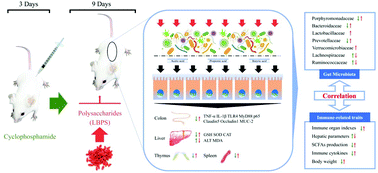In the present study, the effects of Lycium barbarum polysaccharides (LBPS) on immunoregulation and gut microbiota dysbiosis in cyclophosphamide (CTX)-induced mice were investigated to elucidate whether the attenuation of immunosuppression is related to the modulation of the gut microbiota. The results showed that administration of LBPS could protect immune organs (enhancing immune organ indexes and alleviating immune organ damage), enhance the production of immune-related cytokines (IL-2, IL-6, IL-1β, TNF-α and IFN-γ) and prevent the hepatotoxicity in CTX-induced mice. Additionally, LBPS treatment could promote the production of short-chain fatty acids and modulate the composition of the gut microbiota, increasing the relative abundances of Bacteroidaceae, Lactobacillaceae, Prevotellaceae and Verrucomicrobiaceae, which were positively associated with immune traits. The present results indicated that LBPS might regulate the immune response depending on the modulation of the gut microbiota, suggesting that LBPS could be developed as special ingredients for immunoregulation in association with the modulation of the gut microbiota.

